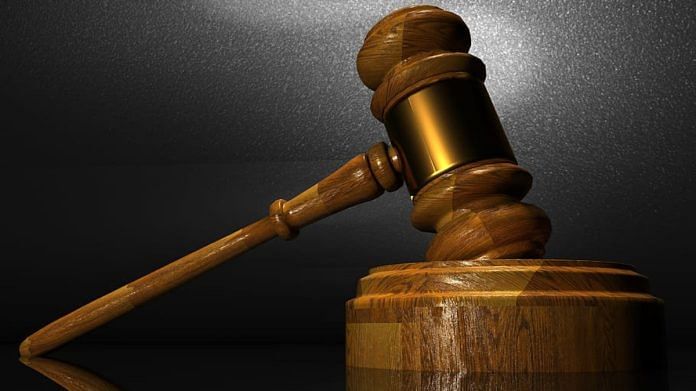Thank you dear subscribers, we are overwhelmed with your response.
Your Turn is a unique section from ThePrint featuring points of view from its subscribers. If you are a subscriber, have a point of view, please send it to us. If not, do subscribe here: https://theprint.in/subscribe/
In the realm of India’s constitutional jurisprudence, the profound and resonating principle that stands tall is any statute that dares to trespass upon the sacred precincts of fundamental rights shall face swift and unyielding retribution. The hallowed corridors of justice are poised to strike down such transgressions. At the heart of this formidable legal edifice lies Article 13 of the Constitution—a cornerstone, an unyielding bastion, and an unequivocal guardian of these precious rights. It speaks volumes about the towering eminence that fundamental rights occupy in the pantheon of Indian legal architecture.
Amidst this constitutional symphony, an enigmatic flaw emerges – do the tendrils of personal rights find refuge within the embrace of the term ‘law’ enshrined in Article 13? Herein lies the crucible of inquiry—the imperative of comprehending the ascendancy of fundamental rights over personal laws.
Should personal laws find sanctuary under the august canopy of Article 13, they would be rendered asunder to the extent that they transgress the bulwarks of Articles 14, 15, and 21 of the Constitution. Article 14, the guardian of equal justice, raises the standard of equality before the law and the shield of equal protection under it. Article 15, a potent beacon of social justice, casts its luminous radiance, decreeing that no law shall be swayed by discrimination based on sex, caste, or any other parameter. And in the hallowed halls of Article 21, the cherished right to life and personal liberty finds its sanctuary, resplendent with an expansive expanse of meaning.
Hence, any personal law that dares to discriminate against women shall be left bare and bereft of legitimacy, inevitably succumbing to the fatal pronouncement of Articles 14 and 15. Its transgressions shall even extend to the precincts of Article 21, as it contends with the inviolable right to life and personal liberty, causing it to wither into oblivion.
In a just society, steeped in the throes of democracy, the zenith of significance must invariably be reserved for fundamental rights. Such precepts demand a privileged place in the echelons of jurisprudence, where their sanctity eclipses any divergence stemming from religious moorings.
Throughout history, the sepulchral chambers resonate with instances of conflict between personal laws and fundamental rights since the dawn of the Constitution’s enactment. The heart of this conundrum lies in the elusive semantics of ‘law’ and ‘law in force’ as delineated in Article 13. If personal laws are encompassed within this purview, fundamental rights shall unequivocally prevail over them, casting them into insignificance. Alas, the Constitution’s penumbral silence on this matter has beckoned the courts to embark on an arduous voyage into the minds of its framers, navigating through the labyrinth of intentions.
The courts, with unwavering rectitude, have shied away from precipitous judgments on matters bearing the imprints of religious sanctity, for they tread on ground fraught with sensitivity and religious ramifications. Yet, amid this judicious caution, the annals of justice also narrate tales of bold strides, where the sword of the law has cleaved asunder personal laws, where injustice has reigned supreme. The profound pronouncement on the constitutionality of triple talaq stands as a glaring testament to the judiciary’s capacity to shatter oppressive edifices and uphold the sanctity of women’s rights.
In the democratic orchestration of a nation, where the inalienable rights of citizens form the fulcrum of governance, it becomes imperative to accord paramountcy to these rights over time-honored beliefs.
The Monsoon Session of Parliament is underway. An imperious call resounds for lawmakers to engage now in earnest discourse, and embolden the Constitution with resolute amendments.
To vanquish the murky ambiguity pervading its provisions, let us unveil these proposed changes, illuminating the path to unequivocal clarity.
First, a decisive stride towards illumination entails enshrining a lucid definition of “law” in Article 13, unequivocally encompassing personal laws within its embrace. Thereafter, with unwavering resolve, we must unfurl personal laws under the hallowed banner of Fundamental Rights, ensuring they espouse the virtues of equality and non-discrimination.
Balancing the scales of justice, we must carve out specific exceptions to preserve the sanctity of religious practices and beliefs, shielding them from infringement while upholding the sanctity of fundamental rights.
In pursuit of a transformative paradigm, a thorough review of Directive Principles, particularly the enigmatic Article 44 beckons. Its resonance, a clarion call for a Uniform Civil Code, demands introspection and resolution.
Harmony lies in judicial consistency. With unwavering focus, we must channel this surge of Constitutional reform to dismantle the bastions of gender inequality and embolden the rights of women within personal laws, heralding an era of justice and equality.
(Mohan Murti is Advocate & former Europe Director of Reliance Industries Limited. He lives in Cologne, Germany)
These pieces are being published as they have been received – they have not been edited/fact-checked by ThePrint.
Also Read: SubscriberWrites: ‘Be a sport’ — Character building by default

